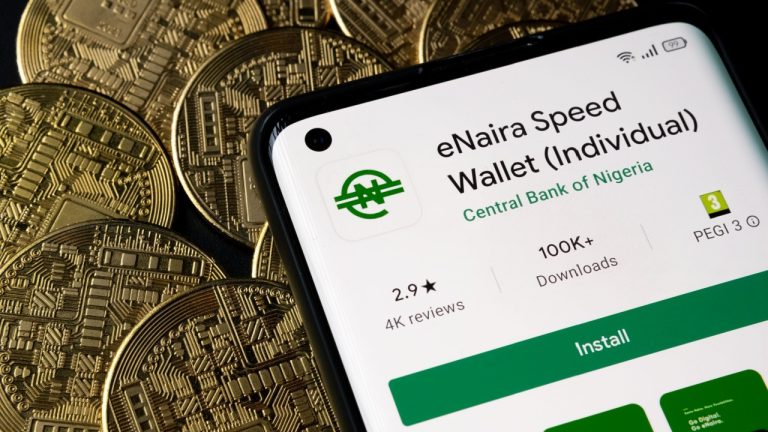 Gluwa, a platform for real-world assets, announced on March 7 its partnership with the Central Bank of Nigeria. The partnership arrangement aims to improve the functionality of the Nigerian central bank’s digital currency and promote financial innovation through blockchain technology. Improving the CBDC’s Utility Gluwa, a real-world assets platform, has entered into a partnership arrangement […]
Gluwa, a platform for real-world assets, announced on March 7 its partnership with the Central Bank of Nigeria. The partnership arrangement aims to improve the functionality of the Nigerian central bank’s digital currency and promote financial innovation through blockchain technology. Improving the CBDC’s Utility Gluwa, a real-world assets platform, has entered into a partnership arrangement […]
The U.S. Federal Reserve is not rolling out a Central Bank Digital Currency (CBDC) anytime soon, according to Fed Chair Jerome Powell. During the Senate Committee on Banking, Housing and Urban Affairs hearing earlier this week, Powell discussed the central bank’s stance on a CBDC as the Biden administration urged continued research and evaluation of […]
The post The U.S. Federal Reserve Is ‘Nowhere Near’ Recommending or Adopting a CBDC, Says Fed Chair Jerome appeared first on The Daily Hodl.
 Federal Reserve Chair Jerome Powell stated before the Senate Committee on Banking, Housing, and Urban Affairs that the United States is far from adopting or even recommending the introduction of a central bank digital currency (CBDC), emphasizing a significant distance from such a possibility. He assured that any potential CBDC would not be designed for […]
Federal Reserve Chair Jerome Powell stated before the Senate Committee on Banking, Housing, and Urban Affairs that the United States is far from adopting or even recommending the introduction of a central bank digital currency (CBDC), emphasizing a significant distance from such a possibility. He assured that any potential CBDC would not be designed for […] Federal Reserve Chairman Jerome Powell engaged with the Senate Banking Committee, signaling that the U.S. is just beginning to contemplate the introduction of a central bank digital currency (CBDC). Powell Assures No Direct Fed Accounts in CBDC Plans, Seeks Congressional Go-Ahead In his conversation with the Senate Banking Committee, Fed Chair Jerome Powell explored the […]
Federal Reserve Chairman Jerome Powell engaged with the Senate Banking Committee, signaling that the U.S. is just beginning to contemplate the introduction of a central bank digital currency (CBDC). Powell Assures No Direct Fed Accounts in CBDC Plans, Seeks Congressional Go-Ahead In his conversation with the Senate Banking Committee, Fed Chair Jerome Powell explored the […] The CBDC Anti-Surveillance State Act has been reintroduced in the Senate with the support of five U.S. senators. “As Americans face the prospect of an increasingly weaponized government, ensuring financial privacy is pivotal,” said one senator who supports the bill. A central bank digital currency (CBDC) “would open the door for the federal government to […]
The CBDC Anti-Surveillance State Act has been reintroduced in the Senate with the support of five U.S. senators. “As Americans face the prospect of an increasingly weaponized government, ensuring financial privacy is pivotal,” said one senator who supports the bill. A central bank digital currency (CBDC) “would open the door for the federal government to […] Russia has proposed the development and implementation of a BRICS-wide payment system that would use central bank digital currencies (CBDCs) to manage trade settlements. The BRICS bridge, as referred to by Russian Finance Minister Anton Siluanov, would address the fragmentation of the current payment system outside the West’s “unfriendly infrastructure.” Russia Hints at Using CBDC […]
Russia has proposed the development and implementation of a BRICS-wide payment system that would use central bank digital currencies (CBDCs) to manage trade settlements. The BRICS bridge, as referred to by Russian Finance Minister Anton Siluanov, would address the fragmentation of the current payment system outside the West’s “unfriendly infrastructure.” Russia Hints at Using CBDC […]
Republican senator Ted Cruz is continuing to press for the US government to ban central bank digital currencies (CBDCs). According to a new press release from Cruz (R-Texas), the Senator is introducing legislation to outright ban CBDCs. According to the release, the legislation is a partisan effort between Sens. Bill Hagerty (R-Tenn.), Rick Scott (R-Fla.), Ted […]
The post Texas Senator Ted Cruz Launches New Legislation To Ban Central Bank Digital Currencies (CBDCs) appeared first on The Daily Hodl.
 A Federal Reserve governor has addressed crypto’s impact on the U.S. dollar’s dominance. Additionally, he expressed reservations about the need for a U.S. central bank digital currency (CBDC) and stated his opposition to banks holding bitcoin exchange-traded funds (ETFs) as their primary asset. Fed Governor on Crypto, CBDC, and the U.S. Dollar Federal Reserve Governor […]
A Federal Reserve governor has addressed crypto’s impact on the U.S. dollar’s dominance. Additionally, he expressed reservations about the need for a U.S. central bank digital currency (CBDC) and stated his opposition to banks holding bitcoin exchange-traded funds (ETFs) as their primary asset. Fed Governor on Crypto, CBDC, and the U.S. Dollar Federal Reserve Governor […] Federal Reserve Chairman Jerome Powell has provided an update to Congress members regarding the Fed’s central bank digital currency (CBDC) work. “If we’re going to have a CBDC, Congress needs to authorize it,” he stressed. Moreover, the Fed chair reportedly said that a framework for stablecoins is needed. Fed Chair Powell on US CBDC and […]
Federal Reserve Chairman Jerome Powell has provided an update to Congress members regarding the Fed’s central bank digital currency (CBDC) work. “If we’re going to have a CBDC, Congress needs to authorize it,” he stressed. Moreover, the Fed chair reportedly said that a framework for stablecoins is needed. Fed Chair Powell on US CBDC and […] The Central Bank of the Philippines will develop a central bank digital currency (CBDC) in the next two years, according to Governor Eli Remolona Jr. The still unnamed CBDC will focus on the wholesale market and won’t use blockchain tech, instead relying on the Philippine Payment and Settlement System, owned and operated by the central […]
The Central Bank of the Philippines will develop a central bank digital currency (CBDC) in the next two years, according to Governor Eli Remolona Jr. The still unnamed CBDC will focus on the wholesale market and won’t use blockchain tech, instead relying on the Philippine Payment and Settlement System, owned and operated by the central […]